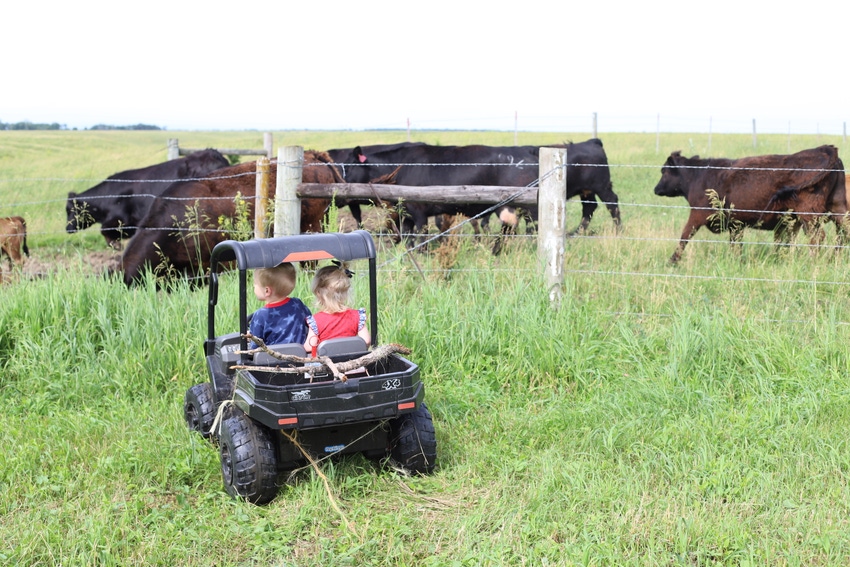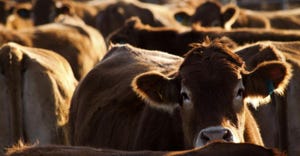We need strong voices to combat the link between climate change and cattle production that is being promoted in today’s news cycle.
September 23, 2019

Cattle and climate change has been THE hot topic for 2019, hands down. It seems like I can’t go a day without reading something in the news about how cows will be the demise of our planet, and we must stop eating meat to save the world.
And despite the sound science that explains otherwise, this is a runaway train that doesn’t appear to be slowing down anytime soon.
In case you missed it, read my recent blog posts on this topic here:
Now lest you think I’m a one-trick pony who only beats to the tune of this drum, I promise you I have other topics planned for the rest of the week, including the very demanded and requested topic of market manipulation in the cattle industry.
I have heard your requests and seen your frustrations online, and I plan to discuss this topic with the knowledge I have. If you would like to submit your input on this issue before I pen my blog, please email me at [email protected]. Also, if there is anything else you would like me to cover in the upcoming weeks, please send your suggestions to my email.
So back to cattle and climate change: You have all been incredible in sharing your stories; news articles; and offers on how you can help since I penned the open letter to Ellen and it going viral last week.
To show you how urgent this matter is and how much engagement we need from advocates, I thought it would be beneficial to show you some recent headlines on this topic. This rhetoric isn’t going away anytime soon, and your voice is critical right now on social media.
Check out these headlines and take a minute to share some facts in the comments section and/or post something positive on social media to balance the conversation!
1. “We are on the cusp of the fastest, deepest, most consequential disruption of agriculture in history” by RethinkX
Here’s an excerpt, “By 2030, the number of cows in the U.S. will have fallen by 50% and the cattle farming industry will be all but bankrupt. All other livestock industries will suffer a similar fate, while the knock-on effects for crop farmers and businesses throughout the value chain will be severe."
2. "Jonathan Safran Foer wants to save the world — beginning with breakfast" featured on Eater.com
In his new book, “We Are the Weather,” the Safran Foer (who was endorsed by Ellen DeGeneres in her video post encouraging folks to #beneateatlessmeat) suggests that we can combat climate change by going vegan for two meals a day.
3. “Don’t go vegan to save the planet. You can help by being a better meat-eater.” by Daniel Payne for USA Today
Payne writes, “It is true that industrial animal farming is ecologically destructive, that it is cruel and barbarous, and that many if not most of the animals unlucky enough to be a part of it suffer in ways that are difficult to comprehend. All of this is well-documented and undeniable. But it doesn’t necessarily follow that you have to go vegan. If you’re uncomfortable with animal farming, but are unwilling to adopt the vegan lifestyle, you don’t need to stop eating meat. You just need to eat better meat.”
4. “Bloomberg editorial pushes for 'Meatless Mondays' to battle climate change” by Rebecca Klar for The Hill
Klar writes, “Bloomberg's editorial board is urging people to eat less meat to help curb climate change, noting both the high levels of greenhouse gas emissions from factory farms and the sheer amount of space cattle ranches use up.”
5. “Can a climate conscious diet include meat or dairy?” by Georgina Gustin for Inside Climate News
“They found that a shift to vegan diets reduced per capita greenhouse gas footprints by 70%, having the lowest per capita carbon impact in 97% of the countries,” said Gustin.
I think these headlines truly encapsulate what the discussions look like in the news and on social media these days. The last one does consider nutritional deficiencies, but the majority ignore the benefits of protein-packed beef and use old and outdated numbers that highly inflate the emissions coming from beef production.
It’s frustrating, maddening, exhausting and time consuming to respond to these, yet we must share our side of the story. If we don’t, who will?
The opinions of Amanda Radke are not necessarily those of beefmagazine.com or Farm Progress.
About the Author(s)
You May Also Like


.png?width=300&auto=webp&quality=80&disable=upscale)

.png?width=300&auto=webp&quality=80&disable=upscale)
